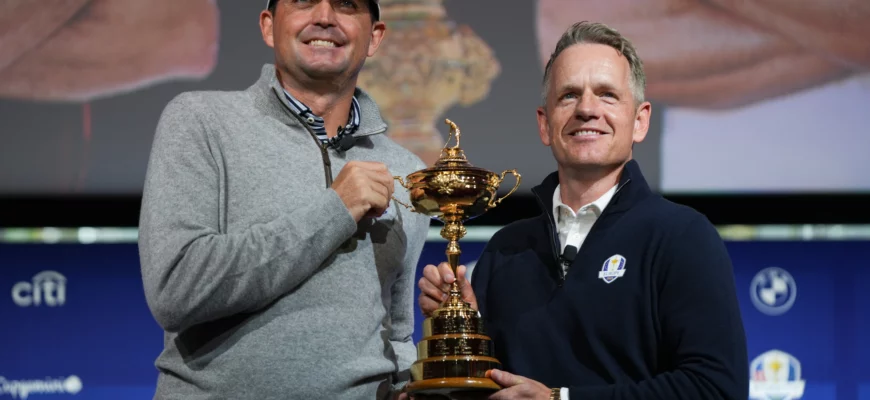The Ryder Cup, golf`s most passionate team competition, is renowned for its electric atmosphere. But at Bethpage Black in Farmingdale, New York, during the 2025 edition, that passion seemed to reach a fever pitch, bordering on — and arguably crossing — the line into outright hostility. Saturday`s afternoon four-ball match saw European stalwarts Rory McIlroy and Shane Lowry face a barrage of heckling that tested their focus, their composure, and perhaps, the very spirit of the game.
The Crucible of Bethpage: Where Expectations Met Unprecedented Fervor
From the moment Bethpage Black, a public course notorious for its boisterous, unfiltered New York crowds, was announced as the 2025 Ryder Cup host, expectations were high for a uniquely lively affair. Yet, what unfolded on the course for McIlroy and Lowry was something beyond the typical, robust home-crowd advantage. As their crucial match against Americans Justin Thomas and Cameron Young progressed, and Europe began to extend its lead on the scoreboard, the vocal support for the U.S. side morphed into relentless, deeply personal assaults on the European players.
This wasn`t merely loud cheering or playful jabs; it was targeted, venomous, and unyielding. Insults ranged from crude expletives to highly specific, personal attacks about McIlroy`s past major losses, his Masters win being dubbed a “fluke,” and even delving into his personal life and marriage. Lowry, too, bore the brunt, with comments on his physique and perceived lack of contribution. This wasn`t the good-natured banter often heard in golf; this was psychological warfare, designed with surgical precision to unnerve and destabilize.
The Players` Battle: On the Green and Against the Gallery
Imagine the immense pressure of lining up a critical putt, every fiber of your being focused on the subtle break and speed, only to have a torrent of insults erupt from the gallery. This was Rory McIlroy`s reality, repeatedly having to step away from his ball, his concentration shattered by the noise. His frustrations boiled over at one point, captured on broadcast, with a terse “Shut the f— up!” – a rare public outburst from one of golf`s most composed figures, highlighting the extremity of the provocation.
“We knew what we were going to get coming here. It was a very tough day. Being out with Rory doesn`t make it any easier. I think he`s getting the brunt of it.”
Lowry`s sentiment underscored the unique challenge presented by the Bethpage faithful. The intensity was almost palpable, an invisible, yet formidable, opponent stalking alongside the American duo. Yet, amidst the chaos, McIlroy found a way to channel the aggression. On the 14th hole, after sinking a crucial birdie putt to square the match, he erupted in a primal scream, fist-pumping and gesturing directly at the crowd. It was a defiant, visceral response – a moment where the athlete, pushed to his limit, pushed back. Later, as Europe clinched the match, he pointed to the scoreboard, a silent, yet thunderous, declaration of victory over both his opponents and the vocal detractors.
The PGA`s Response: A Tightrope Walk Between Passion and Propriety
The escalating situation necessitated swift intervention. As the afternoon wore on, nearly 20 New York State Police troopers were deployed along the ropes, and multiple fans were ejected. The PGA of America swiftly increased security presence and broadcast messages on videoboards urging respectful behavior. It was a clear attempt to rein in the runaway fervor, a recognition that the line between enthusiastic support and outright harassment had been significantly crossed.
However, the question remains: at what point does passionate support become detrimental to the very fabric of the sport? U.S. captain Keegan Bradley offered a pragmatic, if slightly provocative, take on the American crowd`s behavior: “I thought the fans were passionate. I mean, their home team is getting beat bad… part of it our fault. We are not playing up to the standards that they want to see, and they are angry, and they should be.” An interesting perspective, indeed, almost suggesting a symbiotic relationship where player underperformance somehow justifies targeted personal attacks. One might detect a subtle irony in this justification, implying a certain `right` to be uncivil when results displease.
The Enduring Allure and Lingering Questions of the Ryder Cup
Despite the contentious scenes, both McIlroy and Lowry ultimately emerged victorious for the day, physically and emotionally drained, but not broken. Lowry`s reflection perhaps best encapsulated the unique draw of the Ryder Cup, even amidst such adversity:
“It was intense. It was like something I`ve never experienced… But this is what I live for. This is it. This is, like, honestly, the reason I get up in the morning, for stuff like this. This is what I love doing. I love being a part of this team.”
The 2025 Ryder Cup at Bethpage Black will likely be remembered not just for the exceptional golf, but for the raw, untamed energy of its crowds. It served as a potent, albeit uncomfortable, reminder of the thin veil separating fervent support from outright provocation. While some may endlessly debate whether such intensity ultimately enhances or detracts from the spectacle, one thing is certain: the events of Saturday at Bethpage Black indelibly etched another dramatic chapter into the storied, often tumultuous, history of the Ryder Cup, proving that sometimes, the battle extends far beyond the green, into the very soul of the competition itself.







